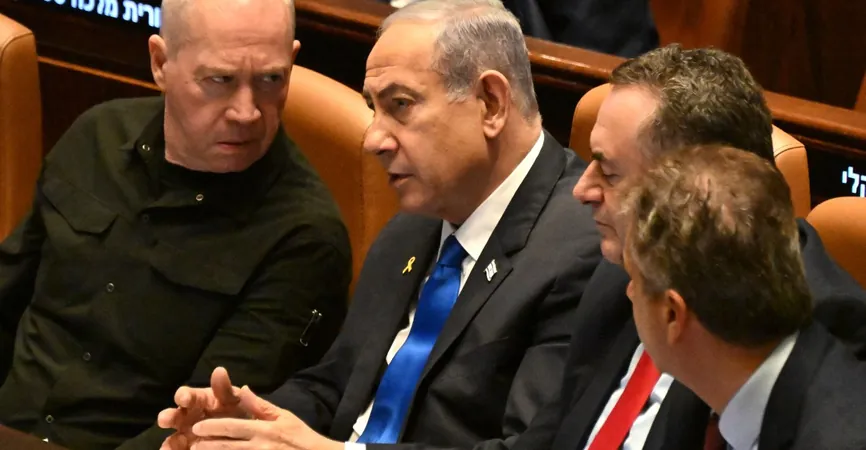
International Arrest Warrants Issued for Netanyahu and Gallant: The Implications and What Lies Ahead
2024-11-22
Author: Chun
International Arrest Warrants Issued: Key Figures
In a significant development, the International Criminal Court (ICC) has issued arrest warrants for Israeli Prime Minister Benjamin Netanyahu, former Defense Minister Yoav Gallant, and Hamas military leader Mohammed Deif, citing war crimes and crimes against humanity. This move has sparked widespread debate and concern regarding its ramifications within the international community.
Legal Context and International Cooperation
While these arrest warrants signal the gravity of the allegations, they do not necessarily guarantee that Netanyahu and Gallant will face trial in The Hague. The effectiveness of these warrants is contingent upon international cooperation, and although some countries have pledged to comply, many others, including Israel and the United States, are unlikely to enforce them due to their non-signatory status with the ICC.
Travel Restrictions and Diplomatic Challenges
According to legal experts, both Netanyahu and Gallant now face increased difficulties traveling internationally, as 124 countries are bound by the ICC treaty to detain individuals facing such charges. This restriction could complicate diplomatic engagements, potentially hampering Israel's international relations and undermining its diplomatic efforts, particularly in Europe. Adil Haque, a law professor at Rutgers University, suggests that Israel's allies might be pressured to distance themselves from leadership that has been accused of such severe violations.
Nature of the Charges
The charges against Netanyahu and Gallant focus on their alleged role in deliberately obstructing humanitarian aid to Gaza, depriving civilians of essential resources such as food, water, and medical supplies. They are also accused of orchestrating attacks on civilians, which exacerbates the humanitarian crisis in the region. In stark contrast, Mohammed Deif faces allegations of murder, torture, and sexual violence through his leadership in Hamas.
Reactions from Israeli Officials
The situation in Gaza has escalated dramatically, with death tolls rising to alarming levels amid ongoing conflict, further intensifying scrutiny over these leaders. Israeli officials, including Netanyahu's office, have vehemently rejected the ICC's jurisdiction, insisting that Israel's military actions are justified in the context of national security. The Israeli government also claims that it has a competent legal system capable of handling violations within its own borders.
Implications for International Relations
As discussions about the ICC and war crimes come to the forefront, it's evident that the implications of these warrants stretch beyond potential arrests. Countries with stringent laws regarding arms transfers are starting to reconsider their relations with Israel. For instance, reports indicate that the Netherlands has halted the transfer of military supplies to Israel, illustrating a cautious approach to international transactions amid mounting allegations.
U.S. Position and Legislative Concerns
Moreover, while the U.S. has historically stood by Israel, some lawmakers and analysts warn that these international charges could lead to an increased distance, even among its allies, particularly those within the ICC framework. Representative Mike Waltz has publicly criticized the ICC's legitimacy, labeling the accusations against Israeli leadership as biased and illustrating the complexities of international diplomatic relations.
Challenges Ahead for ICC Trials
Although the path to an actual trial at the ICC remains fraught with challenges—including the collection of evidence in conflict zones and the logistical hurdles of extradition—this situation serves as a stark reminder of how war crimes allegations can shadow political leaders indefinitely. Kelebogile Zvobgo, a professor of government, highlighted that even in the absence of a trial, the stain of such charges can have lasting effects on public perception and international relations, as there is no statute of limitations on atrocity crimes.
Conclusion: A Shifting Geopolitical Landscape
As the geopolitical landscape continues to evolve, the world watches closely to see how these legal and diplomatic dynamics play out in relation to a deepening crisis in the region. The ramifications of these arrest warrants could reshuffle alliances and reshape the future of Israel's leadership in the international arena.

 Brasil (PT)
Brasil (PT)
 Canada (EN)
Canada (EN)
 Chile (ES)
Chile (ES)
 España (ES)
España (ES)
 France (FR)
France (FR)
 Hong Kong (EN)
Hong Kong (EN)
 Italia (IT)
Italia (IT)
 日本 (JA)
日本 (JA)
 Magyarország (HU)
Magyarország (HU)
 Norge (NO)
Norge (NO)
 Polska (PL)
Polska (PL)
 Schweiz (DE)
Schweiz (DE)
 Singapore (EN)
Singapore (EN)
 Sverige (SV)
Sverige (SV)
 Suomi (FI)
Suomi (FI)
 Türkiye (TR)
Türkiye (TR)